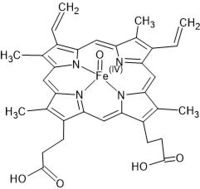User:Tania Girao Mangolini/Sandbox 1
From Proteopedia
| Line 14: | Line 14: | ||
Other residues play essencial roles in the the molecule, as the <scene name='84/845930/Arg38/2'>Arg38</scene> and <scene name='84/845930/Hist42/1'>His42</scene>, which are related to the formation and stabilization of <scene name='84/845930/Compoundi/1'>Compound I</scene> ([http://www.rcsb.org/structure/1HCH 1HCH]), which is the product of a redox reaction between the HRP enzyme and hydrogen peroxide. | Other residues play essencial roles in the the molecule, as the <scene name='84/845930/Arg38/2'>Arg38</scene> and <scene name='84/845930/Hist42/1'>His42</scene>, which are related to the formation and stabilization of <scene name='84/845930/Compoundi/1'>Compound I</scene> ([http://www.rcsb.org/structure/1HCH 1HCH]), which is the product of a redox reaction between the HRP enzyme and hydrogen peroxide. | ||
| - | In this reaction, an <scene name='84/845930/Compoundi_oxy/1'> oxygen atom </scene> donated by the hydrogen peroxide binds to the heme group. The image below shows | + | In this reaction, an <scene name='84/845930/Compoundi_oxy/1'> oxygen atom </scene> donated by the hydrogen peroxide binds to the heme group. The image below shows in details the heme group associated with the oxygen: |
| - | [[Image:Horseadich_compoundI_hemeO.jpg| | + | [[Image:Horseadich_compoundI_hemeO.jpg|200px]] |
Cyclically, the Compound I forms the <scene name='84/845930/Compoundii_v2/1'>Compound II</scene> ([http://www.rcsb.org/structure/1H55 1H55]), which loses electrons to restore the HRP enzyme's original state: | Cyclically, the Compound I forms the <scene name='84/845930/Compoundii_v2/1'>Compound II</scene> ([http://www.rcsb.org/structure/1H55 1H55]), which loses electrons to restore the HRP enzyme's original state: | ||
Revision as of 21:11, 2 June 2020
HORSERADISH PEROXIDASE C1A
|
Horseadish (Armoracia rusticana) is a plant that belongs to the Brassicaceae family. The roots of this plant are rich in peroxidases, being the HRP C isozymes the most common ones. [1] However, most of the HRP research has focused on one isozyme: (1H58) [2].
Structural highlights
HRP C1A is composed by 308 residues and the residue at is Ile according to the GenBank entry M37156.1 but Tyr according to the GenBank entry HE963800.1 [2].
The molecule has a predominantly α-helical , with the exception of one short β-sheet region, and it is separated into a distal and a proximal region, each one with a .
In the center of HRP C1A there is a , which is linked to the molecule by a coordinate bond of the heme iron with a conserved residue [1].
There are sites for N glycosylation in the loop regions, at residues[1]. All these glycosylated Asn residues are located on the surface of C1A[2].
Other residues play essencial roles in the the molecule, as the and , which are related to the formation and stabilization of (1HCH), which is the product of a redox reaction between the HRP enzyme and hydrogen peroxide. In this reaction, an donated by the hydrogen peroxide binds to the heme group. The image below shows in details the heme group associated with the oxygen:
Cyclically, the Compound I forms the (1H55), which loses electrons to restore the HRP enzyme's original state:
Besides the HRP C1A's Peroxydase Cycle, it is also known an Oxidase Cycle, that is related to defense against patogens and wounds [1]. This cycle is responsible for the production of the (1H57), which has some associated to it.
References
- ↑ 1.0 1.1 1.2 1.3 Veitch, N.C. Horseadich peroxidase: a modern view of a classic enzyme 65:249-259 (2004). DOI: 10.1016/j.phytochem.2003.10.022
- ↑ 2.0 2.1 2.2 Krainer, F.W; GLIEDER, A. An updated view on horseradish peroxidases: recombinant production and biotechnological applications v. 99, pages 1611–1625 (2015). DOI: 10.1007/s00253-014-6346-7



